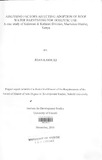| dc.description.abstract | This study sought to examine factors that influence the adoption of Rainwater Harvesting (RWH) Technology by looking at socioeconomic economic factors that influence adoption of RWH. Various socioeconomic characteristics were considered. They included education of household head, gender, family size, income, roofing material, technology access to information age, group networking and sources of income. Data was collected using a combination of data collection methods including; survey interviews, key informant interviews and direct observation.
Therefore, the main objective of the study was to examine factors that influence the adoption of RWH in Kathiani and Kalawani division of Machakos district. Data collected was cleaned, coded and keyed in preparation for analysis, was analyzed by use of SPSS and summarized according to the study objectives using descriptive and inferential statistics such as frequency tables, cross tabulation, charts and bar graphs to come up with conclusions and recommendations.
The findings revealed that lack of finances played key role in hindering adoption of RWH, in addition inaccessibility to information and poor technology too contributed to lack of adoption of RWH for domestic use. Roofing material was observed not to be a problem in the area but storage facilities and guttering was observed to hinder adoption of R WHo.The study therefore concluded that adoption of RWH in Kathiani and Kalawani divisions has been hindered due to the lack of resources necessary for installing RWH structures.
In addition inadequate access to information particularly by women and lack of knowledge on maintaining of RWH technologies has contributed to lack of adoption of RWHo
The study therefore recommends that deliberate efforts be put in place to avail resources for subsidizing R WH in the area. The study also recommends capacity building of community with regards to RWH technology. | en_US |

